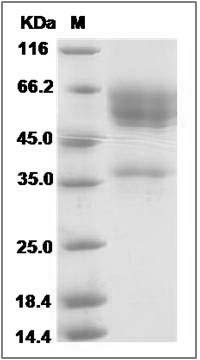-
Product Name
Human NKG2D / CD314 (Fc Tag) recombinant protein
- Documents
-
Description
NKG2D, also known as CD314, is an immune receptor which consists of two disulphide-linked type II transmembrane proteins with short intracellular proteins uncapable to transduce signals. In order to transduce signals, NKG2D needs adaptor proteins and it uses two adaptor proteins, DAP10 and DAP12. These two adaptor proteins associate as homodimers to NKG2D- therefore the entire receptor complex appears as a hexamer. NKG2D can send co-stimulatory signals to activate CD8 T cells. NKG2D also plays an important role in viral control. Cellular stress can induce ligands for NKG2D which results in the cell susceptible to NK cell-mediated lysis.
-
Protein name
HCG2009644, isoform CRA_b
-
Uniprot ID
P26718
-
Gene Name
KLRC4-KLRK1; hCG_2009644
-
Source/Expression Host
CHO Cells
-
Expression Plasmid/cDNA
A DNA sequence encoding the human NKG2D (NP_031386.2) (Phe78-Val216) was expressed with the Fc region of human IgG1 at the N-terminus.
-
Protein Species
Human
-
Molecular weight
The recombinant human NKG2D/Fc comprises 418 amino acids and has a predicted molecular mass of 46.5 kDa. The apparent molecular mass of the protein is approximately 50-64 and 37 kDa in SDS-PAGE under reducing conditions.
-
Purity
(81.4+13.9) % as determined by SDS-PAGE
-
Activity
Immobilized human ULBP1-His (Cat:503370) at 10 μg/ml (100 μl/well) can bind human S4-Fc3L3-NKG2D, The EC50 of human S4-Fc3L3-NKG2D is 0.39-0.91 μg/ml.
-
Validations

Human NKG2D / CD314 / KLRK1 Protein (Fc Tag) SDS-PAGE
Related Products / Services
Please note: All products are "FOR RESEARCH USE ONLY AND ARE NOT INTENDED FOR DIAGNOSTIC OR THERAPEUTIC USE"
